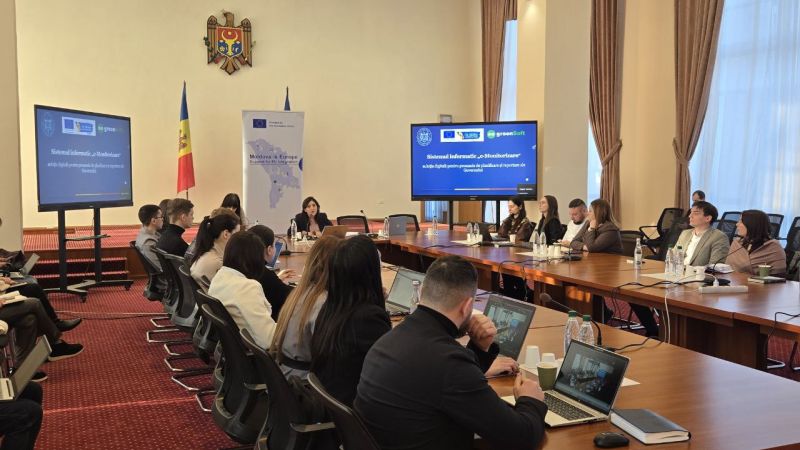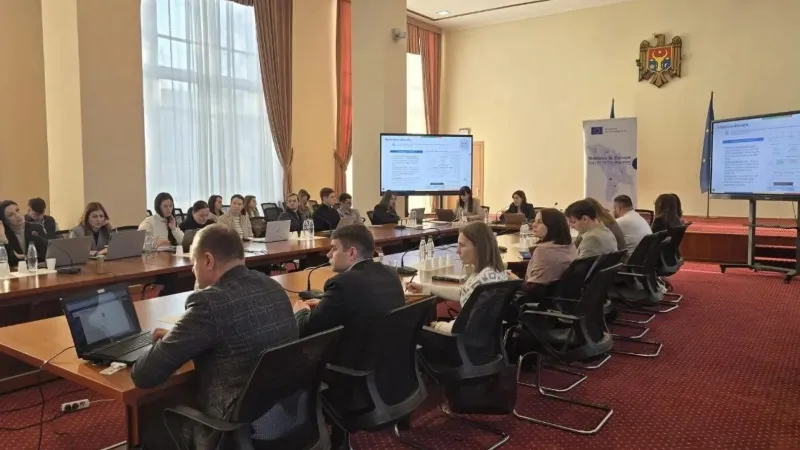
Informarea corespunzătoare despre legislația și politicile în domeniul concurenței – contribuind la un nivel adecvat de cultură a concurenței în beneficiul cetățenilor
Proiectul finanțat de Uniunea Europeană „Sprijin pentru dialogul politic structurat, coordonarea implementării Acordului de Asociere și îmbunătățirea procesului de aproximare legală” a sprijinit Republicii Moldova, instituțiile sale, societatea de afaceri și cetățenii în procesul de integrare în UE în domeniul legislației și politicii în domeniul concurenței. În cadrul proiectului finanțat de UE menționat mai sus, a fost elaborat și prezentat Consiliului Concurenței un manual special pentru inspecții inopinate, precum și un manual de aplicare a legislației în domeniul concurenței, ca ghid și instrument de aplicare eficientă a legii. De asemenea, în cadrul proiectului a fost prezentată o scurtă analiză a diferitelor opțiuni organizaționale ale autorităților de concurență, precum și analiza fuziunii propuse între Consiliul Concurenței și ANRE (Autoritatea de reglementare în domeniul energiei din Republica Moldova). În plus, a fost elaborat și un studiu special privind „Legislația în domeniul concurenței în sectorul telecomunicațiilor”, pentru a evidenția provocările din acest sector sensibil.
În general, legislația și politica în domeniul concurenței sunt aspecte foarte complexe și va fi nevoie de sprijin suplimentar, în funcție de necesitățile specifice ale beneficiarilor și ale instituțiilor relevante din Republica Moldova. Un manual de conformare în domeniul concurenței (corporativă), precum și Ghidul pentru combaterea manipulării ofertelor în domeniul achizițiilor publice pot fi documente foarte utile pentru a fi elaborate, prezentate și utilizate, prin urmare, proiectul ar putea oferi sprijin suplimentar în aceste domenii în viitorul apropiat, în scopul de a îmbunătăți domeniul concurenței în beneficiul cetățenilor. Informarea corespunzătoare cu privire la regulile, posibilitățile și beneficiile concurenței constituie un instrument eficient pentru creșterea gradului de conștientizare, contribuind astfel la un nivel adecvat de cultură a concurenței.
Legislația și politica eficientă în domeniul concurenței a fost întotdeauna elementul de bază al filozofiei UE și reprezintă unul dintre pilonii economiei de piață eficiente și, implicit, ai pieței interne a UE. Prin urmare, este extrem de important ca Uniunea Europeană să depună eforturi considerabile pentru introducerea și protejarea regulilor de concurență de către statele membre, precum și de către toate țările care au încheiat acorduri speciale cu Uniunea Europeană, inclusiv Republica Moldova.
O economie de piață eficientă este de interes central pentru toți – pentru consumatori, deoarece aceștia pot beneficia de o mai mare varietate de opțiuni și de un mai bun raport calitate/preț; pentru întreprinderile care concurează pe piață, deoarece acestea pot avea succes datorită perspicacității și ingeniozității lor în afaceri, cu condiția să li se asigură condiții de concurență echitabile; și pentru economiile naționale, deoarece concurența eficientă, care este elementul de bază și inevitabil al unei economii de piață eficientă, contribuie la o mai bună competitivitate și la creștere economică.
Cu toate acestea, concurența eficientă (și economia de piață) nu se poate realiza de la sine – există trei elemente de bază care sunt inevitabile pentru a asigura o concurență eficientă; aceste elemente sunt: (a) un cadru juridic transparent, nediscriminatoriu și ușor de utilizat, care să faciliteze intrarea pe piață și să ridice nivelul de presiune concurențială, (b) instituții credibile și (c) punerea în aplicare efectivă a normelor.
Consiliul Concurenței dispune de o serie de competențe – potențialele distorsiuni ale concurenței pot fi detectate, demonstrate și interzise, iar sancțiunile pot fi aplicate pe baza sesizării unor presupuse încălcări.
Consiliul Concurenței al Republicii Moldova deține competență exclusivă nu numai în domeniul antitrust (acorduri restrictive și abuz de poziție dominantă) și controlul concentrărilor, așa cum se întâmplă de obicei în majoritatea statelor membre ale UE, dar are, de asemenea, competența de a se ocupa de ajutorul de stat, de concurența neloială, precum și de denaturarea concurenței de către stat, care se reflectă în primul rând în actele autorităților locale.
Acest domeniu de competență necesită independența și autonomia Consiliului Concurenței pentru a asigura aplicarea regulilor de concurență fără nicio presiune, fie politică, fie bazată pe potențiale interese de capital. Acesta este un standard comun în Uniunea Europeană și în statele sale membre și, prin urmare, reprezintă, o cerință obligatorie și un angajament ferm în cadrul Acordului de asociere.

Independența funcțională și absența diferitelor presiuni reprezintă un element cheie pentru implementarea corectă a normelor și, implicit, pentru un bilanț credibil de aplicare a tuturor instituțiilor cărora li s-au acordat autorizații în numele interesului public, ceea ce trebuie să fie o condiție prealabilă incontestabilă și pentru Consiliul Concurenței, gardianul interesului public într-o economie de piață. Scopul legislației și politicii în domeniul concurenței este de a asigura condiții de concurență echitabile și o punere în aplicare eficientă, în special prin prevenirea denaturărilor – combaterea cartelurilor și a abuzurilor de poziție dominantă și interzicerea concentrărilor care ar împiedica în mod semnificativ concurența efectivă.
La ce etapă se află Republica Moldova în ceea ce privește implementarea legislației și politicilor în domeniul concurenței?
Republica Moldova și-a asumat angajamente specifice și clare cu privire la transparența legislației și a politicii în domeniul concurenței și la punerea în aplicare a acesteia, precum și la independența funcțională a instituțiilor în cauză, în conformitate cu prevederile Acordului de asociere.
Cu toate acestea, Acordul de Asociere nu este singurul document cu caracter obligatoriu pentru Republica Moldova în ceea ce privește legislația și politica în domeniul concurenței. Prevederi substanțiale similare pot fi identificate și în articolele 19-21 din Acordul CEFTA, la care Moldova face parte.
Ținând cont de faptul că o poziție dominantă pe piață sau o putere semnificativă pe piață poate fi înțeleasă ca o barieră specifică de intrare pe piață, o legislație și o politică solidă în domeniul concurenței este foarte importantă și în contextul respectării regulilor OMC privind comerțul dintre națiuni, astfel încât este foarte important să cunoaștem regulile, să le respectăm și să cunoaștem cum să reacționăm în cazul unei potențiale denaturări a concurenței, fie că este vorba de o denaturare activă sau pasivă.







